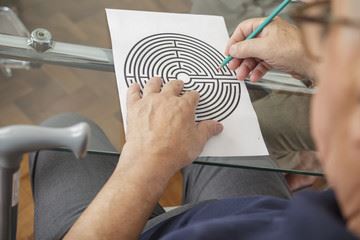
A common worry among older adults is cognitive decline. Older adults may worry about possible cognitive decline even when standardized tests fail to reveal signs of cognitive deficits. Adults with subjective cognitive decline are often anxious about their perceived loss of ability and emotionally reactive to minor acts of forgetfulness.
Marchant et al. [Psychotherapy and Psychosomatics] conducted a randomized controlled study to test the effect of a mindfulness-based intervention on anxiety in older adults with subjective cognitive decline compared to health self-management program.
The researchers recruited 147 participants (average age=73 years; 65% female) from memory clinics located in four European cities. Participants were self-referred or referred by physicians to the clinics because of their subjective memory complaints, but performed normally on standardized cognitive tests. Clinic patients with mild cognitive impairment, dementia, depression and anxiety disorders were excluded from the study.
Participants were randomly assigned to a Caring Mindfulness Approach for Seniors (CMBAS) program, or a health self-management program. CMBAS was modeled after the Mindfulness Based Stress Reduction program, and held in groups for 2-hours per week for 8 weeks. The program was tailored to the needs of older adults and emphasized compassion and lovingkindness meditation.
The health self-management program had the same structure and format as CMBAS, and emphasized sleep hygiene, stress management, exercise, diet, communication, memory, and action plans for improving health. Participants completed the State-Trait Anxiety Inventory and the Geriatric Depression Scale at baseline, post-intervention, and 6-month follow-up.
The results showed significant reductions at post-intervention in trait anxiety for both CMBAS (d=0.31) and health self-management (d=0.26) groups without any statistically significant superiority found for CMBAS. The reductions in trait anxiety were maintained at 6-month follow-up for both groups.
The CMBAS group had a significant decline in state-anxiety at post-intervention, but this was not significantly different from the smaller decline in the health self-management group.
Approximately equal percentages of CMBAS (15%) and health self-management (14%) participants experienced clinically meaningful anxiety improvements. Neither intervention reduced depressive symptoms, but depressive symptoms were already low at baseline.
The multinational clinical trial showed an adapted mindfulness or health self-management intervention reduced trait anxiety in older adults with subjective cognitive decline immediately after intervention and at 6-months after intervention end.
The study is limited by its lack of a passive control group to determine if mere monitoring over time by the study team tends to reduce anxiety among people concerned over cognitive decline. The findings cannot be generalized to those with anxiety disorders as those eligible had only subclinical symptoms of anxiety.
Reference:
Marchant, N. L., Barnhofer, T., Coueron, R.,...Molinuevo, J. L. (2021). Effects of a Mindfulness-Based Intervention versus Health Self-Management on Subclinical Anxiety in Older Adults with Subjective Cognitive Decline: The SCD-Well Randomized Superiority Trial. Psychotherapy and Psychosomatics.
Link to study